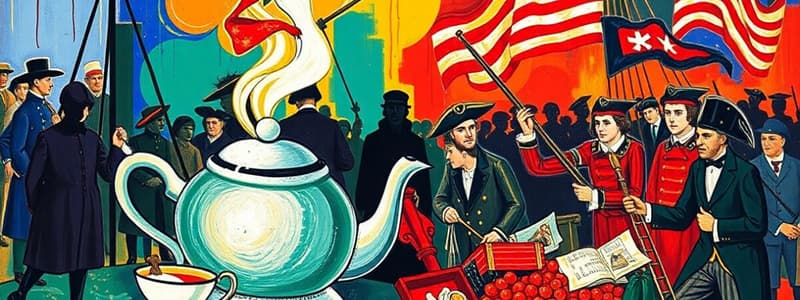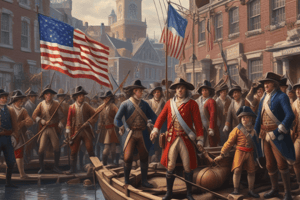Podcast
Questions and Answers
What was the primary reason for the Boston Tea Party?
What was the primary reason for the Boston Tea Party?
- Colonists wanted to support British tea companies.
- Colonists refused to buy British tea due to taxes. (correct)
- Colonists wanted to promote Dutch tea over British tea.
- Colonists were encouraged by British officials.
What was the intended message behind the Boston Tea Party?
What was the intended message behind the Boston Tea Party?
- To support local tea merchants.
- To cause harm to British officials.
- To establish independence from British rule.
- To express frustration with the British government non-violently. (correct)
Which of the following was NOT one of the Intolerable Acts enacted by King George III?
Which of the following was NOT one of the Intolerable Acts enacted by King George III?
- Trials for British officials in British courts.
- Mandatory direct elections for colonial governors. (correct)
- Closing Boston Harbor until tea was paid for.
- Limiting town meetings to once a year.
What was the reaction of the governor of Boston to the Sons of Liberty's demand regarding the British tea ships?
What was the reaction of the governor of Boston to the Sons of Liberty's demand regarding the British tea ships?
What did the Intolerable Acts reflect about British views on the colonies after the Boston Tea Party?
What did the Intolerable Acts reflect about British views on the colonies after the Boston Tea Party?
What was one result of the first Continental Congress?
What was one result of the first Continental Congress?
What role did Paul Revere play during the events leading to the battles of Lexington and Concord?
What role did Paul Revere play during the events leading to the battles of Lexington and Concord?
What happened at the town of Lexington?
What happened at the town of Lexington?
What decision was made at the Second Continental Congress regarding military leadership?
What decision was made at the Second Continental Congress regarding military leadership?
What was the primary goal of the Green Mountain Boys' attack on Fort Ticonderoga?
What was the primary goal of the Green Mountain Boys' attack on Fort Ticonderoga?
Which group was more likely to be a loyalist during the colonial unrest?
Which group was more likely to be a loyalist during the colonial unrest?
What was King George's reaction to the petition from the Second Continental Congress?
What was King George's reaction to the petition from the Second Continental Congress?
How were the British troops viewed at the battles of Lexington and Concord?
How were the British troops viewed at the battles of Lexington and Concord?
What was a common characteristic of Washington’s army during the early stages of the conflict?
What was a common characteristic of Washington’s army during the early stages of the conflict?
What was a key activity undertaken by colonists in Boston as resistance preparations?
What was a key activity undertaken by colonists in Boston as resistance preparations?
What did the French do to protect their fur trade during the conflicts?
What did the French do to protect their fur trade during the conflicts?
What was a significant difference in the fighting styles between the French and British during the war?
What was a significant difference in the fighting styles between the French and British during the war?
Which statement best describes the aftermath of the French and Indian War for France?
Which statement best describes the aftermath of the French and Indian War for France?
What was the result of the Albany Plan of Union proposed by Benjamin Franklin?
What was the result of the Albany Plan of Union proposed by Benjamin Franklin?
Which Native American group allied with the British during the French and Indian War?
Which Native American group allied with the British during the French and Indian War?
What was a consequence of the Treaty of Paris in 1763 for Spain?
What was a consequence of the Treaty of Paris in 1763 for Spain?
What was one way the French showed respect for Native American cultures?
What was one way the French showed respect for Native American cultures?
In what year did the French and Indian War officially end?
In what year did the French and Indian War officially end?
Flashcards
What was the Boston Tea Party?
What was the Boston Tea Party?
The Boston Tea Party was a protest by American colonists against British taxation and control over tea trade. Colonists disguised as Native Americans boarded British ships and dumped 342 chests of tea into Boston Harbor.
Why did colonists refuse to buy British tea?
Why did colonists refuse to buy British tea?
The colonists refused to buy British tea because of the tax imposed by the Townshend Act. They instead opted for smuggled tea from the Dutch and French.
Who were the Sons of Liberty?
Who were the Sons of Liberty?
The Sons of Liberty were a group of patriots who organized and led the protest against British policies. They played a significant role in the Boston Tea Party, demanding the British tea ships leave the harbor.
What were the Intolerable Acts?
What were the Intolerable Acts?
Signup and view all the flashcards
What is civil disobedience?
What is civil disobedience?
Signup and view all the flashcards
The Quartering Act
The Quartering Act
Signup and view all the flashcards
First Continental Congress
First Continental Congress
Signup and view all the flashcards
Committees of Correspondence
Committees of Correspondence
Signup and view all the flashcards
Battle of Lexington
Battle of Lexington
Signup and view all the flashcards
Battle of Concord
Battle of Concord
Signup and view all the flashcards
Minutemen
Minutemen
Signup and view all the flashcards
Second Continental Congress
Second Continental Congress
Signup and view all the flashcards
Petition to King George III
Petition to King George III
Signup and view all the flashcards
Patriots
Patriots
Signup and view all the flashcards
Loyalists
Loyalists
Signup and view all the flashcards
What was the French and Indian War?
What was the French and Indian War?
Signup and view all the flashcards
Why did the French and Indian War begin?
Why did the French and Indian War begin?
Signup and view all the flashcards
What was the role of westward expansion in the French and Indian War?
What was the role of westward expansion in the French and Indian War?
Signup and view all the flashcards
Who was Benjamin Franklin's role in the French and Indian War?
Who was Benjamin Franklin's role in the French and Indian War?
Signup and view all the flashcards
How did the French approach their relationship with Native Americans?
How did the French approach their relationship with Native Americans?
Signup and view all the flashcards
How did the British approach their relationship with Native Americans?
How did the British approach their relationship with Native Americans?
Signup and view all the flashcards
What was significant about the Battle of Quebec?
What was significant about the Battle of Quebec?
Signup and view all the flashcards
What were the main outcomes of the Treaty of Paris?
What were the main outcomes of the Treaty of Paris?
Signup and view all the flashcards
Study Notes
Chapter 3: The Revolutionary Era
- The period encompasses events from 3.2 to 3.4 within the Revolutionary Era.
Taking Up Arms
- The period highlights the escalating conflicts between the British and the colonists.
The Boston Tea Party
- The British controlled the type of tea available in the colonies.
- Taxes on tea from the Townshend Acts led colonists to reject British tea.
- Colonists bought smuggled tea from the Dutch and French.
The Boston Tea Party (continued)
- The Sons of Liberty actively blocked ships from unloading cargo.
- On December 16, 1773, Sons of Liberty representatives met with the Boston governor to demand the removal of British tea ships from Boston Harbor.
- The governor refused to comply with the request to remove the ships from the port.
- Colonists, disguised as Native Americans, boarded the ships and dumped 342 chests of tea into the harbor.
- This act was a form of civil disobedience, designed to express frustration with the British government without resorting to violence.
King George III Reacts
- King George III believed the colonies deserved punishment for the Boston Tea Party.
- The act resulted in 4 intolerable laws.
- First, Boston Harbor was closed until the colonists paid for the destroyed tea.
- Second, colonists were not allowed to hold town meetings more than once a year. This restricted the ability of colonists to organize and protest.
- Third, British officials accused of crimes were tried in British courts rather than colonial courts. This removed the colonists' ability to judge their own officials.
- Fourth, The Quartering Act was enacted, requiring colonists to provide housing and provisions for British soldiers. This placed a significant financial and logistical burden on the populace.
The First Continental Congress
- Boston obtained support from other colonies due to correspondence spreading news of the Intolerable Acts.
- The middle and southern colonies sent rice, corn, and flour to the colonies in the north-east. This provided essential sustenance for the colonies facing economic hardship and political instability.
- The colonies conducted a meeting in Philadelphia to address British issues.
- The congress involved delegates from 12 colonies (Georgia was excluded).
- A resolution supporting Massachusetts was approved by delegates. This demonstrated unity among the colonies.
- The colonists boycotted British goods. This was a prominent act of defiance against British policies.
- Colonists created militias for self-defense. This demonstrated the colonists' readiness to defend their rights.
- A second meeting was planned for May 1775.
Lexington and Concord
- Colonists in Boston prepared for resistance.
- Soldiers stockpiled weapons and gunpowder.
- In 1775, British commanders learned of weapon storage outside of Boston.
- The British planned a surprise attack on the Concord weapons storage site.
- On April 18, 1775, British troops tried to take over the stockpile of weapons.
- Sons of Liberty used lamps as a signalling system to alert other towns of the British troops' movement.
- Paul Revere warned citizens about the impending attack. This was a critical element of the colonists' preparedness.
- On April 19, the British reached Lexington and were met by 70 minutemen.
- An unknown person fired a shot, marking the beginning of the battle, and 8 colonists lost their lives.
- The British moved to Concord, but their efforts to seize the supplies were thwarted by armed resistance.
- 300 minutemen confronted the British, forcing them to retreat. The colonial militia successfully repelled the British forces.
- Many British soldiers were killed or wounded.
- These battles marked the end of any hope for a peaceful resolution between the British and the colonists. The colonists successfully defended their rights, escalating the conflict significantly.
King George Rejects Peace
- The Second Continental Congress convened in May 10, 1775, with all 13 colonies participating.
- A petition to King George III, expressing the colonists' loyalty, was submitted. This represented a final attempt at peaceful resolution.
- However, King George III was angered by the petition and vowed to deal with the colonists’ resistance. This signaled the escalation of the conflict.
- The British sent more troops to the colonies. Increased military presence signified Britain's intention to enforce its authority.
- The Continental Congress decided to create a full colonial army with George Washington as commander. This demonstrated the colonists' willingness to resort to armed conflict if necessary.
Green Mountain Boys
- Ethan Allen, a Vermont blacksmith, led the attack on Fort Ticonderoga in New York.
- The Vermont militia was known as the Green Mountain Boys.
- The Green Mountain Boys targeted weapons, gunpowder, and cannons at the fort.
- The fort was strategically important due to its location near Canada.
- The Green Mountain Boys successfully overpowered the fort, capturing supplies and control. This established the Green Mountain Boys as an important military force for the colonies.
Patriot vs Loyalist
- Patriots supported the colonists' rebellion against Britain.
- Patriots often owned weapons and were led by George Washington. The Patriots represented a significant portion of the colonial population.
- Loyalists remained loyal to Britain. Loyalists faced pressure from Patriots.
- Loyalists were often wealthy merchants and were often attacked by Patriots. The loyalists often faced persecution and violence.
Washington's Army
- Washington's army faced organizational and training issues.
- The army lacked sufficient supplies. The shortage of resources put a strain on the soldiers' commitment and ability to fight.
- There was no navy. This significantly limited the colonists' ability to conduct naval operations.
- Troops prioritized fighting near their own home over travel. This highlighted a critical limitation of Washington's army.
Studying That Suits You
Use AI to generate personalized quizzes and flashcards to suit your learning preferences.





